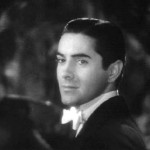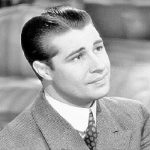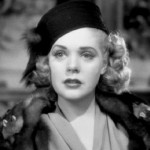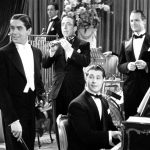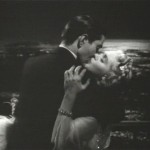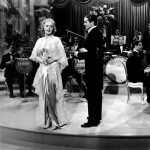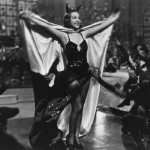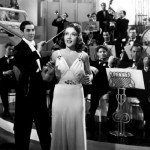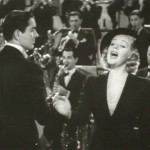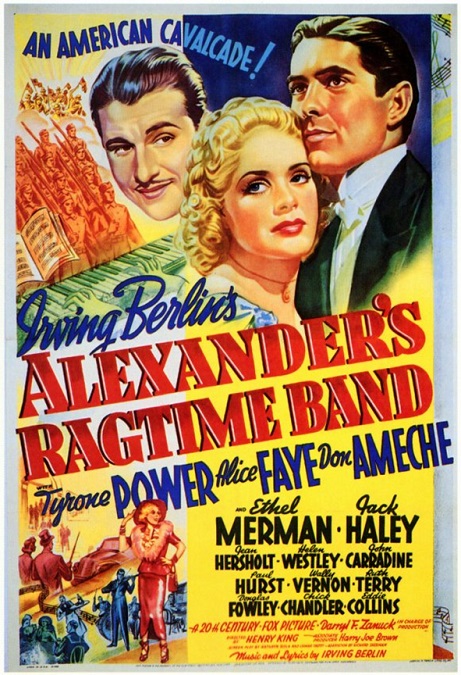
Alexander’s Ragtime Band – 1938
I have to admit that this movie surprised me. It was a fictionalized film about the beginnings of jazz music and its transition from ragtime into the swing movement of the late 1930s. On the surface, it was a pretty standard film. Boy meets girl, boy loses girl, boy and girl both become successful, boy gets girl back. The end.
But what surprised me was that despite its simple plot, I ended up caring about what happened to the characters. I’m not exactly sure why, but at the film’s climax, I was worried that the star-crossed couple might not find their ways back to each other. Director Henry King did a good job of weaving a fictional story around historical events. The characters were a little larger than life, as is normal for a light drama, but they were not over the top.
The movie starred Tyrone Power as the fictional Alexander, the band leader who popularized the new sound the people couldn’t get enough of. The woman who sang with him, by mistake at first, was Stella Kirby, played by Alice Faye. Her character was very loosely based on real-life singer Emma Carus who originally made the film’s title song popular.
When the two first meet, it was hate at first sight. But eventually, through the music of Alexander’s pianist, Charlie Dwyer, played by Don Ameche, the two realized that they were hopelessly in love and that they were destined to be together.
And there we had our three main characters. Of course, there is a little plot device of a love triangle, where Charlie is in love with Stella. They even go so far as to wed after Alexander and the singer separate because of a fight involving her blossoming career. They concoct a scheme to get whole band noticed by a Broadway producer who, unfortunately, only notices Stella.
Powers was good in his role. At times he was a good man while at others he was a real jerk. Having both good and bad elements to his character made him believable and therefore, easier to empathize with. Faye was also good, her character having the same light and dark qualities.
The one that really bothered me was Ameche. First, I had a problem with his character, and second with his acting. As to the character, he was too perfect a guy. Charlie was in love with Stella but came to understand that she was in love with Alexander. So what does he do? He meekly steps out of the way and allows them to be together. No jealously. No hard feelings. He even peacefully divorces her and helps her to be with her true love.
But the second problem was worse. Ameche’s acting style didn’t seem to fit with the rest of the cast. Everyone else acted like regular people, but Ameche acted like a creepy little crooner. Every line of dialogue was said in a low, soft voice like he was trying really hard to seduce someone. It was distracting and sometimes took me a little out of the story.
Another star in the film was Ethel Merman, playing the part of Jerry Allen. She became the band’s main singer after Stella left. Now, normally, I don’t really care for Merman, neither the characters she plays, nor her voice. But she surprised me on both counts. The character of Jerry Allen was a good natured and smart woman, especially in the scene where Alexander proposes to her. She admits that she had once had hopes of receiving his affections, but she was wise enough to know that he was in still in love with Stella. Not only does she refuse to marry him, she stays on as his singer and does a fantastic job. Sure, her brash belt was still there, but it had moments of softness that sounded great.
And this brings us, finally, to the phenomenal music. The score was written by Irving Berlin. Not only was I already familiar with the title song, I also knew several other great tunes like Heat Wave, Blue Skies, Easter Parade and A Pretty Girl Is Like a Melody. Of course, the film’s scoring was done by Alfred Newman, but the songs were all Berlin’s. In fact, the story itself was written by Berlin as well. And I loved how none of the music was gratuitous. It was all part of the plot. The songs didn’t tell the story, but they were all part of it. All in all, this was a well-constructed movie.
